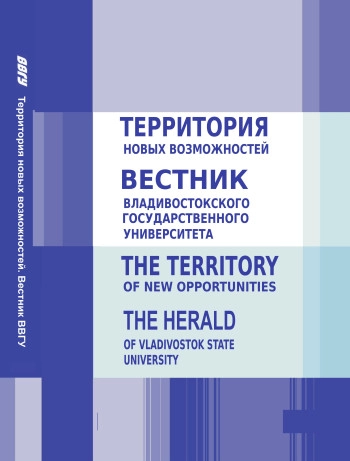graduate student
The academic paper focuses on the development of a multi-criteria decision-making methodology for integrating Chinese logistics operators into Russia's agricultural product transportation ecosystem. In the context of globalization and shifting international trade chains, the integration of national logistics systems into a unified digital infrastructure becomes strategically significant. Special attention is given to analyzing barriers related to differences in regulatory requirements, levels of digitalization, and political instability between the two countries. The study centers on COFCO Corporation, the largest Chinese distributor of agricultural products, and evaluates various integration strategies into the Russian logistics system us- ing Fuzzy Analytic Hierarchy Process Fuzzy AHP and Fuzzy TOPSIS methods. The application of these methods allows for the consideration of uncertainty and variability in decision-making, while also forming a flexible model capable of adapting to changes in the external environment. The proposed methodology is applicable for assessing optimal integration options in conditions of high geo-economic instability and technological compatibility. It holds practical value for enhancing operational efficiency, reducing costs, and improving the resilience of agricultural product supply chains.
logistics systems integration, China-Russia cooperation, logistics barriers, analytic hierarchy process, international trade, operational efficiency, agricultural products, logistics integration strategy, digital ecosystem, supply chains
1. Gvilia N.A., Parfenov A.V., Shulzhenko T.G. Management of integrated inter-corporate logistics systems in the digital economy. Manager. 2019; 10 (1): 40–51. DOI: https://doi.org/10.29141/2218-5003-2019-10-1-4; EDN: https://elibrary.ru/YYQIKD
2. Russian Export Center. URL: https://www.exportcenter.ru/press_center/agroekspress-vodin-klik-ao-rzhd-logistika-sovmestno-s-rets-zapustili-tsifrovoy-servis-na-platforme-/
3. Healthy China 2030. URL: http://www.gov.cn/xinwen/2016-10/25/content_5124174.htm
4. COFCO Corporation. URL: http://www.cofco.com
5. PRC Ministry of Agriculture. URL: http://www.moa.gov.cn/
6. Eurasian Economic Commission. URL: https://eec.eaeunion.org/
7. Murev D.I. Business ecosystems and new mechanisms for coordinating joint activities. Main mechanisms for the development of entrepreneurship in the face of modern challenges: International Scientific and Practical Conference: Sat. scientific. Art. / hole ed. A.P. Shikhverdiyev; FSBEI HE "Syktyv. state. un-t them. Pitirim Sorokin". Syktyvkar: Publishing House of SSU named after Pitirim Sorokin; 2023. P. 80–85. EDN: https://elibrary.ru/NGNDRI
8. Gvilia N.A., Dun D. Modern approaches to ntegrated planning of agricultural supply chains. Izvestia of St. Petersburg State Economic University. 2024; 1 (145): 121–127.
9. № 1 (145). S. 121–127.
10. Federal Center for the Development of Agricultural Exports of the Ministry of Agriculture of the Russian Federation: [website]. URL: https://aemcx.ru/export/rusexport/
11. Mikhailyuk M.V. Digital business ecosystems of the region: development difficulties. Financial research. 2022; 3 (76): 52–58. DOI: https://doi.org/10.54220/finis.1991-0525.2022.76.3.005; EDN: https://elibrary.ru/ZFNBRO
12. Chang D.Y. Applications of the extent analysis method on fuzzy AHP. European Journal of Operational Research. 1996; 95 (3): 649–655. URL: https://doi.org/10.1016/0377-2217(95)00300-2 EDN: https://elibrary.ru/ANQNGV
13. Saaty T.L. A Scaling Method for Priorities in Hierarchical Structures. Journal of Mathematical Psychology. 1977; 15 (3): 234–281. URL: https://doi.org/10.1016/0022-2496(77)90033-7
14. A new fuzzy multi-attribute group decision-making method based on TOPSIS and optimization models / C. Hu, X. Hu, Y. Liu, & X. Zhang. 2023. URL: https://arxiv.org/abs/2311.15933
15. An interval-valued fuzzy number approach for supplier selection / C.-S. Lee, C.-C. Chung, H.-S. Lee [et al.]. Journal of Marine Science and Technology. 2016; 24 (3).Article 2. DOI:https://doi.org/10.6119/JMST-015-0521-8
16. Wang Y.-M., Chin K.-S. Fuzzy analytic hierarchy process: A logarithmic fuzzy preference programming methodology. International Journal of Approximate Reasoning. 2011. 52 (4): 541–553. DOI:https://doi.org/10.1016/j.ijar.2010.12.004
17. Shcherbakov V.V., Shulzhenko T.G. Strategic priorities for regulating the orientation and intensity of cargo flows in the new macroeconomic situation. Railway transport. 2022; (9): 51–55. EDN: https://elibrary.ru/PTFLZA
18. Shcherbakov V.V. Digital logistics is the key to the transformation of cooperation chains Izvestia of St. Petersburg State Economic University. 2022; 6 (138): 132–137. EDN: https://elibrary.ru/KYLGDD





